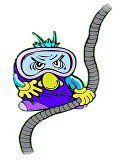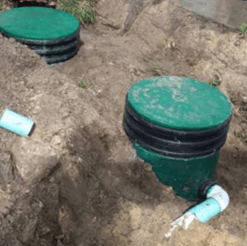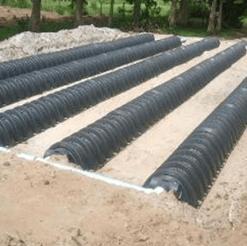The Real Low Down on Your Septic System
If you can think of everything that goes down the toilet, sinks and shower drains, then you can imagine that it has to go someplace. For some, it's city sewer (still have to watch what you flush), but for you, it's likely a septic system.
Septic systems date back to the 1860s, granted a lot has changed since then.
Back to the basics, anything that goes through the washing machine, down the toilet or washed down the drain eventually makes its way to the septic tank. Inside the septic tank is where the magic happens, so to speak. The waste starts to break down and settles to the bottom of the tank, and we call this the sludge. Then all the toilet paper, body oils, food substances, hair, etc. make up the scum layer on top. The middle layer of liquid is the effluent water that is eventually going to be dispersed throughout the drain field and absorbed into the ground through the soils.
Knowing what goes down your drains is important. Septic systems have a science that allows them to work naturally. But, when you do unnatural things, you get unnatural results. For example, the usage of a garbage disposal on a septic system allows for food particles and fats and oils to kill off the good bacteria needed in your tank. This leads to a thicker scum layer and more frequent pumping, maybe even line blockages with sewage backups.
Septic tanks should be maintained and serviced like everything else in life. You can't install it and forget about it (well, you could, but don't). Let's think of pumping your tank like changing the oil in your car. You see no issues, and you do it so many miles to prolong the life of your engine. The same goes for pumping your septic tank. Pump it to prevent damage to your drain field.
Septic Tank Maintenance
The single MOST important thing you can do for your septic tank is, PUMP IT OUT on a routine basis. Septic tanks should be pumped every 3-5 years, depending on the size of your household. Pumping your tank removes all the sludge buildup on the bottom of the tank and gives you a chance to check your septic tank's condition and if there are any immediate repairs or precautions, you should take. Solids that are too high and scum layers that are too thick, all from lack of pumping or good bacteria, can start to exit the tank and enter the drain field. The only thing that should enter your drain field is effluent water. The purpose of pumping the septic tank is to remove the buildup of solids and scum layer. When your system makes a gurgling noise, that's the tell-tale sign that things are about to go to (blank), poop!
When you hear the gurgle, it's time to get the boots on because it's about to get stinky. IF YOU HAVE AN EFFLUENT FILTER (inside your septic tank, generally only new houses and houses that have had upgrades to the septic have one), gurgling is the #1 sign that your filter is clogged. If you don't have a filter and the gurgling is there, you can have a few things going on, and it's best to have someone come out and look at it. It could be a simple fix just with pumping or it could mean you have trouble with the drain field. Either way, DO NOT IGNORE THE GURGLE. There are some instances where there won't be any signs of trouble, but you're still in danger. Leaking plumbing and septic tanks that aren't sealed watertight can eliminate the gurgle as a warning.
Don't wait until you have a problem to pump your septic tank. Pumping your septic tank should be a maintenance task (It's kind of like changing the oil in your car. If you don't, then the engine fails and it's way more costly. The same idea applies to your tank). LUCKY FOR YOU, WE KNOW OUR POOP. You can call anytime, day or night, and we will be happy to assist.
Septic System Installations
New installations are generally for brand new construction. In few cases are new installations performed on lots that have had a previous septic system.
If you plan on building a home or having a modular installed on your property, we would love to go over all your permitting and setup requirements to determine the best time to install your septic system.
We offer full package deals and fast scheduling.
If you have an upcoming or current project that requires a septic system, please submit your permitting to our office and we will provide you with a written proposal with all the needed requirements included.
Submit Permit/Plan
We will get back to you as soon as possible.
Please try again later.
Residential Repairs
If you own a home or plan to build a home with a septic system, we would love to offer our services. Drainfield repairs are performed on already established septic systems and can vary depending on multiple factors. The year of your home, the square footage, the number of bedrooms, and the size of your family all contribute to your drainfield repair. It's important to install a septic system that works for your family and not a standard minimal septic system. We would be glad to take the time and review the best option for your needs.
Free Estimates
We offer to come to your home and review your scenerio at no charge to you. You can contact our office at (863) 763-0665 to schedule an appointment or simply fill out a form below.
Commerical Systems
We are proud to provide services to commercial customers. We can offer services to large wastewater facilities and service and maintain lift station systems.
We are educated in the design of today's wastewater systems and can provide simple and quality design.
Submit Commercial Permit/Plan
We will get back to you as soon as possible.
Please try again later.
Contact Us
Thank you for contacting us.
We will get back to you as soon as possible.
Oops, there was an error sending your message.
Please try again later.
Browse Our Website
Contact Information
Office: (863) 763-0665
Service: (863) 357 0918
Email: austinsewer@yahoo.com
Fax: 866 630 7088





Business Hours
- Mon - Fri
- -
- Sat - Sun
- Closed
After hours services are available upon request
*After hour emergency service an extra cost
Family Owned & Operated Since 2005
Licensed & Insured





